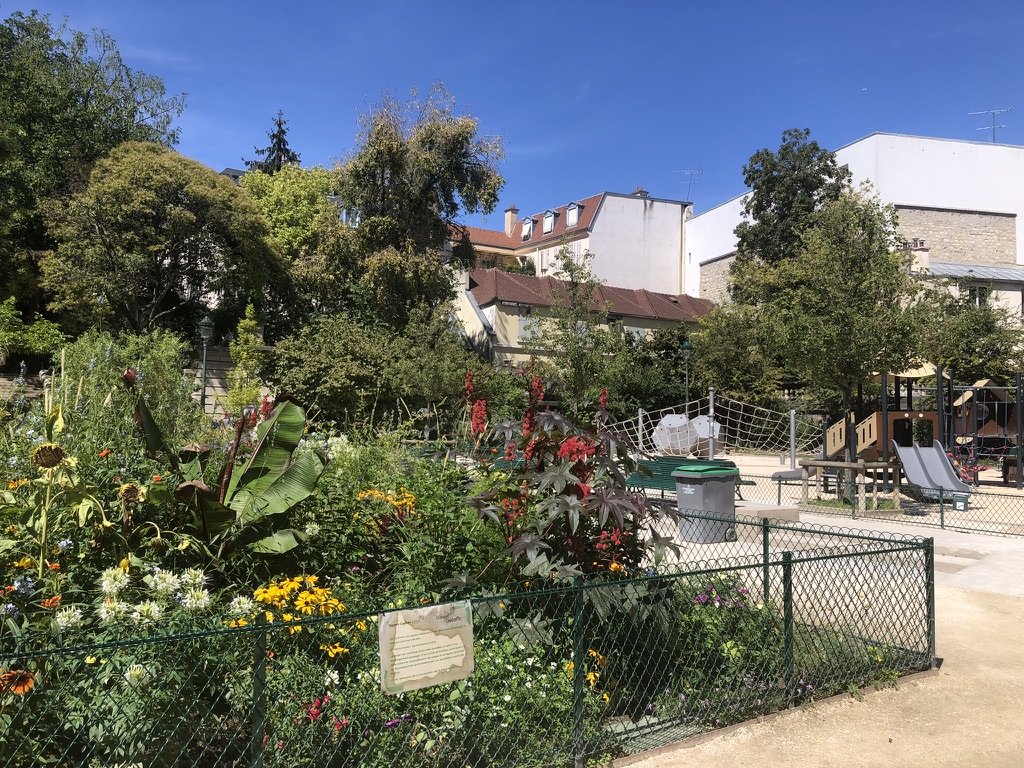I have really loved these last two weeks in Paris during which our excursions have been a little shorter and less-regimented. I feel like with more time and a chiller agenda in terms of Things To See, I have really been able to experience the slow pace of life here. I’m really living it up with the people-watching and cafe society which are so endemic to Paris. Just the other day, I met and had a conversation with a bartender who was also studying literature and wanted to be a writer. He said he liked working as a bartender because it was great for character studies. Awesome, right? I can totally imagine Dickens or Hugo hanging around a cafe, pub, or bar watching people walk through the door and thinking about how to render them in writing.
Beautiful garden we happened upon when flaneuring, that made me smile :) It feels like such a privilege to have moments like these!
It feels so luxurious to be able to spend my afternoons lounging around, going to cafes, and flaneuring because it is such a different pace than what I’m used to back in Los Angeles. To the point where I’m really dreading returning to real life. At home, there are always things to do- I’m volunteering, working, studying, going to class, cooking, cleaning, walking my dog, trying to network, etc etc etc. I maintain a constant state of doing things, to the point where I feel guilty when I find a little bit of down time. It’s like, we have such a culture of productivity in the States, where time is money and if you’re not making money you’re being lazy. And I know this mentality is totally a social construct. As a sociology major, I’ve read theories behind this; Weber’s book The Protestant Ethic and the Spirit of Capitalism suggests that when the Protestants originally came to the States, maintaining a good work ethic was evidence you were predestined to go to heaven, and the accumulation of capital was for the glorification of God. But along the way, the means to worship became the end- good work ethic and reinvestment for the continual growth of capital just became valued for what it was, and is a huge part of American culture today. And despite so many French people saying Paris has a busy busy work culture, I haven’t felt even the tiniest speck of what I feel in the US here. Maybe that’s because I’m here as a student, and I have most of the day available. But it really does feel that life in France is different. Is this why all the writers flocked here in the 1800s?
Going to Shakespeare and Co where famous authors like Ernest Hemingway and F. Scott Fitzgerald lived felt right. I could totally understand why Americans would want to come here to write. The balance of life is better and the social value on quality of life is more inspiring and conducive to art. Reading the excerpt from Edmund White’s The Flaneur confirmed for me that a culture which accepts being - not producing, not working - but just being and noticing, sparks creativity in a way that the deadline-oriented States does not.
“The flâneur is by definition endowed with enormous leisure, someone who can take off a morning or afternoon for undirected ambling. since a specific goal or a close rationing of time is antithetical to the true spirit of the flâneur. An excess of the work ethic (or a driving desire to see everything and meet everyone of recognized value) inhibits the browsing, cruising ambition to ‘wed the crowd’. Americans are particularly ill-suited to be flâneurs.”
To be fair, and in agreement with the quote above, I am discussing the quality of life for a very specific and privileged group of individuals. Maintaining a slow pace of life, the passivity of a flaneur, presupposes the means to maintain such a lifestyle. Furthermore, I found myself a little hesitant to flaneur around by myself in unfamiliar areas as a woman. So being a flaneur is furthermore restricted by safety considerations. Actually, thinking about how identities shape the ability to be a flaneur, I wonder: if Hugo and Dickens had been wealthy flaneurs from the start, would they be as concerned with the state of society? Probably not! They might be curious about it, but I think without Dickens growing up poor, working in a boot blacking factory, he would not have been able to write a character like Dr. Manette. And Hugo was an activist whose villainous character Thenardier was named after political opponent Louis Thenard. Both of their real-life struggles shaped the novels we read and celebrate today, and I really don’t think they would carry the same punch if the authors were truly flaneurs. So maybe, while flaneuring can allow breathing room for creativity, some pressure is also necessary to create art. There is a balance to be found between the Parisian lifestyle and the American lifestyle, or at least that’s what I’ll tell myself as I woefully fly home. Well, I don’t have the answers. it’s at least something to ponder as I wiggle on…
